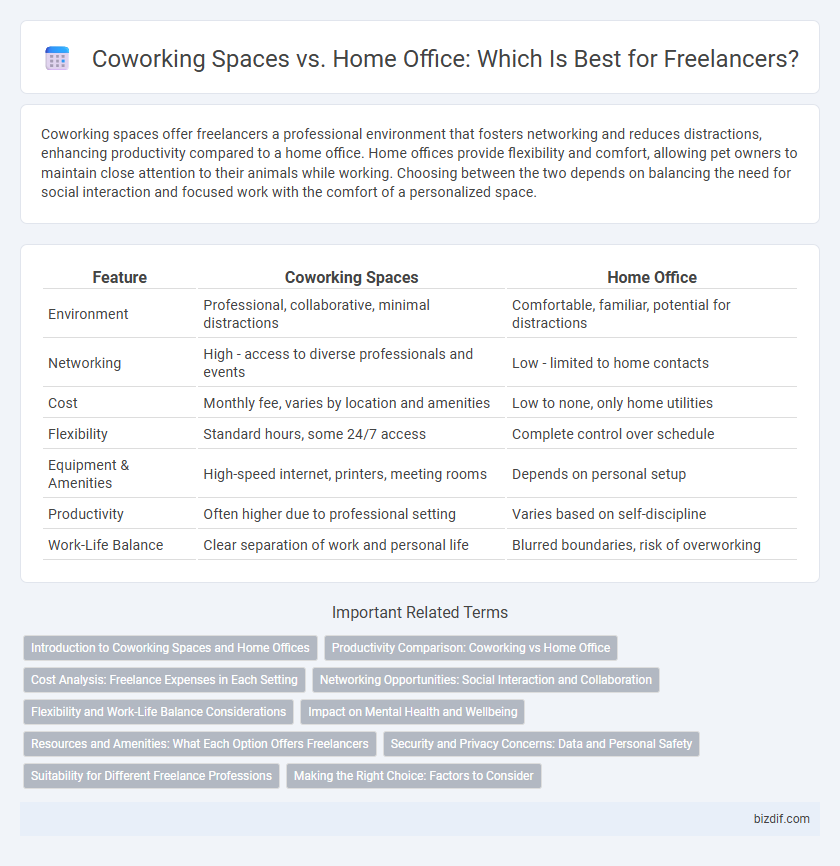Coworking spaces offer freelancers a professional environment that fosters networking and reduces distractions, enhancing productivity compared to a home office. Home offices provide flexibility and comfort, allowing pet owners to maintain close attention to their animals while working. Choosing between the two depends on balancing the need for social interaction and focused work with the comfort of a personalized space.
Table of Comparison
| Feature | Coworking Spaces | Home Office |
|---|---|---|
| Environment | Professional, collaborative, minimal distractions | Comfortable, familiar, potential for distractions |
| Networking | High - access to diverse professionals and events | Low - limited to home contacts |
| Cost | Monthly fee, varies by location and amenities | Low to none, only home utilities |
| Flexibility | Standard hours, some 24/7 access | Complete control over schedule |
| Equipment & Amenities | High-speed internet, printers, meeting rooms | Depends on personal setup |
| Productivity | Often higher due to professional setting | Varies based on self-discipline |
| Work-Life Balance | Clear separation of work and personal life | Blurred boundaries, risk of overworking |
Introduction to Coworking Spaces and Home Offices
Coworking spaces offer freelancers a professional environment equipped with high-speed internet, meeting rooms, and networking opportunities that foster collaboration and productivity. Home offices provide personalized comfort and flexibility but may lack the social interaction and structured workspace that coworking environments deliver. Choosing between the two depends on factors such as work style, need for community, and the ability to minimize distractions.
Productivity Comparison: Coworking vs Home Office
Coworking spaces enhance productivity by providing a structured environment with fewer personal distractions, reliable high-speed internet, and opportunities for networking and collaboration. Home offices offer personalized comfort and flexibility but may introduce interruptions and lack motivational stimuli found in coworking environments. Studies indicate freelancers using coworking spaces report higher focus levels and task completion rates compared to those working solely from home.
Cost Analysis: Freelance Expenses in Each Setting
Coworking spaces typically involve monthly membership fees ranging from $150 to $500, covering utilities, high-speed internet, and networking opportunities, whereas home office expenses include upfront costs for ergonomic furniture, internet installation, and increased utility bills averaging $50 to $200 per month. Freelancers in coworking environments may benefit from tax deductions on memberships and shared office resources, while home offices allow for more personalized, one-time investments that can depreciate over time. Evaluating overall expenses reveals coworking spaces offer predictable monthly costs, while home offices require higher initial investments but lower ongoing fees.
Networking Opportunities: Social Interaction and Collaboration
Coworking spaces offer freelancers enhanced networking opportunities through regular social interaction and collaborative events, fostering connections that can lead to new projects and partnerships. Unlike the isolated environment of a home office, coworking spaces provide access to diverse professionals, enabling knowledge sharing and skill development. These dynamic settings promote a community-driven atmosphere crucial for career growth and expanding professional networks.
Flexibility and Work-Life Balance Considerations
Coworking spaces offer freelancers flexible work environments with structured schedules that can enhance productivity and social interaction, supporting a clearer separation between professional and personal life. Home offices provide unmatched flexibility, allowing individuals to customize their work hours and surroundings, which can improve work-life balance if managed effectively. Prioritizing personal discipline in home offices and leveraging amenities in coworking spaces are key to optimizing flexibility and maintaining a healthy work-life balance.
Impact on Mental Health and Wellbeing
Coworking spaces offer freelancers structured social interaction and a professional environment that can reduce feelings of isolation, significantly benefiting mental health and overall wellbeing. Home offices, while providing comfort and flexibility, may increase the risk of loneliness, distractions, and blurred work-life boundaries, potentially leading to stress and burnout. Choosing the right workspace is crucial for freelancers aiming to maintain productivity while supporting their psychological resilience and emotional balance.
Resources and Amenities: What Each Option Offers Freelancers
Coworking spaces provide freelancers with access to high-speed internet, professional conference rooms, printing facilities, and networking events, enhancing productivity and collaboration. Home offices offer customizable environments with personalized amenities but may lack the advanced resources and social interaction found in coworking locations. Choosing between the two depends on the freelancer's need for specialized equipment, community engagement, and work-life balance.
Security and Privacy Concerns: Data and Personal Safety
Coworking spaces often present heightened risks to data security due to shared networks and limited control over physical access, making sensitive client information vulnerable to breaches. Home offices, by contrast, allow freelancers to implement personalized security measures such as encrypted Wi-Fi, dedicated firewalls, and secure hardware, enhancing data protection and privacy. Personal safety is also more controllable in a home environment, reducing exposure to potential threats found in public coworking venues.
Suitability for Different Freelance Professions
Coworking spaces offer freelance designers and marketers a collaborative environment with access to networking opportunities and creative resources, enhancing productivity and inspiration. Home offices suit writers, developers, and consultants who require quiet, personalized spaces for focused, uninterrupted work and flexible scheduling. Choosing between coworking spaces and home offices depends on the freelancer's need for social interaction, workspace customization, and job-specific demands.
Making the Right Choice: Factors to Consider
Choosing between coworking spaces and a home office depends on factors such as productivity levels, social interaction needs, and budget constraints. Coworking spaces offer structured environments with networking opportunities and professional amenities, while home offices provide personalized comfort and flexible hours. Evaluate your work style, potential distractions, and cost-effectiveness to make the right decision for your freelancing success.
Coworking spaces vs Home office Infographic

 bizdif.com
bizdif.com